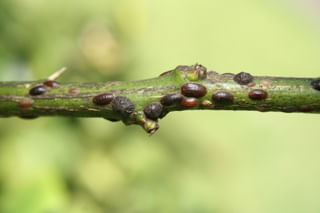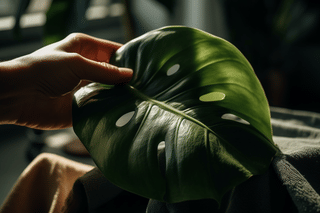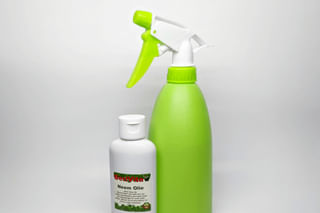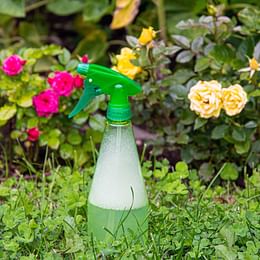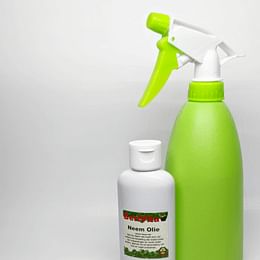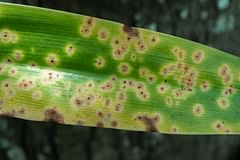How to Get Rid of Scale Insects on Houseplants
Learn the simple steps to banish scale insects from your houseplants and keep them healthy with our easy-to-follow guide. Say goodbye to sticky leaves and hello to vibrant, thriving plants.
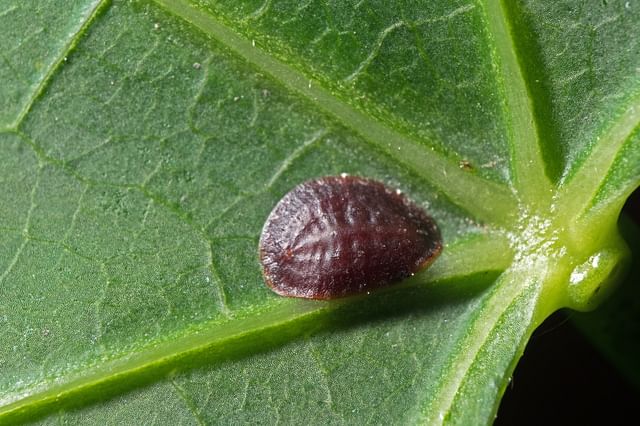 Have you ever noticed small bumps on your houseplants' leaves or stems that are hard to remove? Those could be scale insects. Don't worry, though - getting rid of them is easier than you might think! In this plant care guide, we'll go through a step-by-step process for getting rid of scale insects on your houseplants.
Have you ever noticed small bumps on your houseplants' leaves or stems that are hard to remove? Those could be scale insects. Don't worry, though - getting rid of them is easier than you might think! In this plant care guide, we'll go through a step-by-step process for getting rid of scale insects on your houseplants.
Scaly pests can be difficult to manage, and they can harm your houseplants. However, with a bit of effort, you can take care of these pests and ensure a healthy environment for your plants to thrive. Follow these tips and techniques to say goodbye to scale insects and hello to a healthier, happier plant collection!
These are the topics we're going to go over together in this plant care guide:
Are you ready to take a few steps to get rid of scale insects and keep your houseplants healthy? Let's get started!
What are Scale Insects?
Before you can start treating your houseplants for scale insects, it's important to make sure you're dealing with these pests. Many common houseplants look a lot alike and need different methods of treatment.
This is what scale insects look like:
- Small brown, black, or gray bumps or "scales" on the stems or leaves of your plant
- Yellowing or wilting leaves
- Sticky residue on the leaves or surrounding areas, which is caused by the honeydew scale insects produce
These tiny, oval-shaped pests like to make themselves at home on the stems or leaves of your plants. But the big question is: are they harmful to your plant's health and growth? Let's take a closer look and find out together!
How do scale insects harm your plant?
Scale insects, like most other common pests, are harmful to your plant and will spread quickly if you don't control the infestation quickly. They feed on plant sap, which can weaken the plant and even kill it if left untreated.
Scale insects weaken your plant, which makes your plant susceptible to other pests, as it can't defend itself as well and recover as quickly.
Luckily, scale insects are only harmful to your plants and won't cause any harm to you or your pets.
Can scale insects spread to other houseplants and how can that be prevented?
When you first notice your plant is suffering from scale insects, it's important to isolate your plant quickly. Scale insects can spread from plant to plant, so any infected plants should be kept separate from your other plants.
After you've isolated any of the infected houseplants, it's time to treat your houseplant and help to get rid of the pests once and for all. Let's learn how to do that!
How do you get rid of scale insects?
Now that you've verified that you're dealing with scale insects on your plant, it's time to get rid of them and help your houseplant thrive again. Here are some steps you can take to get rid of these pests:
Step 1: Prune Infested Areas
Using a pair of sharp, clean scissors or pruning shears, carefully remove any leaves or stems that are heavily infested with scale insects. Make sure to discard these parts in a sealed plastic bag or container, so the scale insects can't accidentally spread to other plants.
Step 2: Wash the Plant
A great method for getting rid of scale insects is to wash the plant with a gentle, soapy water solution. The key here is to use a soap that is non-toxic and doesn't contain any harsh chemicals that could potentially harm the plant.
To create the solution, simply mix a small amount of the soap with water and apply it to the infested areas of the plant with a soft cloth or sponge. Be sure to rinse the plant thoroughly afterward to avoid any buildup of soap residue.
While washing a plant with a soapy water solution may seem like a simple solution, it can be an effective way to get rid of scale insects and keep your houseplants healthy.
Step 3: Use an Insecticide
If the infestation is particularly bad, you may need to use an insecticide to get rid of the scale insects. However, insecticides can be harmful to your plants, so use them sparingly and according to the instructions on the label. Insecticides with neem oil or pyrethrins are good options.
It might take several rounds of cleaning/treating your plant to completely get rid of the infestation. In general, you should continue treating the plant until the scale insects are completely gone. This can take anywhere from a few days to a few weeks.
During this process, make sure to regularly check up on your plant to see if you can remove any scale insects that are hiding in hard-to-reach places.
How do you prevent scale insects from infecting your plant?
When you've gotten rid of the scale insects on your plant, you're almost done. All that's left now is to make sure they don't come back. You can do this with several preventive measures.
The best way to deal with scale insects in the future is to prevent them from attacking your plants in the first place. Here are some tips to help you avoid a scale insect infestation:
- Inspect new plants before bringing them into your home. Make sure they don't have any signs of scale insects or other pests.
- Always keep new plants separate from your other plants for at least 14 days
- Clean the leaves of your houseplants regularly with a damp cloth. This not only keeps your plant nice and shiny but also removes any pests and helps you to inspect your plant.
- Avoid over-fertilizing your plants, as this can attract pests. Many pests thrive on the extra nutrients they can get from your plant if you fertilize it heavily.
- Use a neem oil spray on your plants once a month to help deter pests.
You shouldn't just take these steps to prevent scale insects, or any other pests, after you've had to deal with pests on your houseplants. It's best to treat any of your plants using one or more of these methods regularly. This way, you'll rarely have to deal with pests and you can just enjoy your plants.
Thank you for reading this post! I hope it helps you to keep your plants healthy and beautiful! If you're looking for more guides on specific plants, you can always request a plant guide to get a guide for the plant you have trouble with.
Test your plant care knowledge
Quiz completed!
Want to learn more? Sign up for my newsletter to receive free tips in your inbox!
Sign up now!